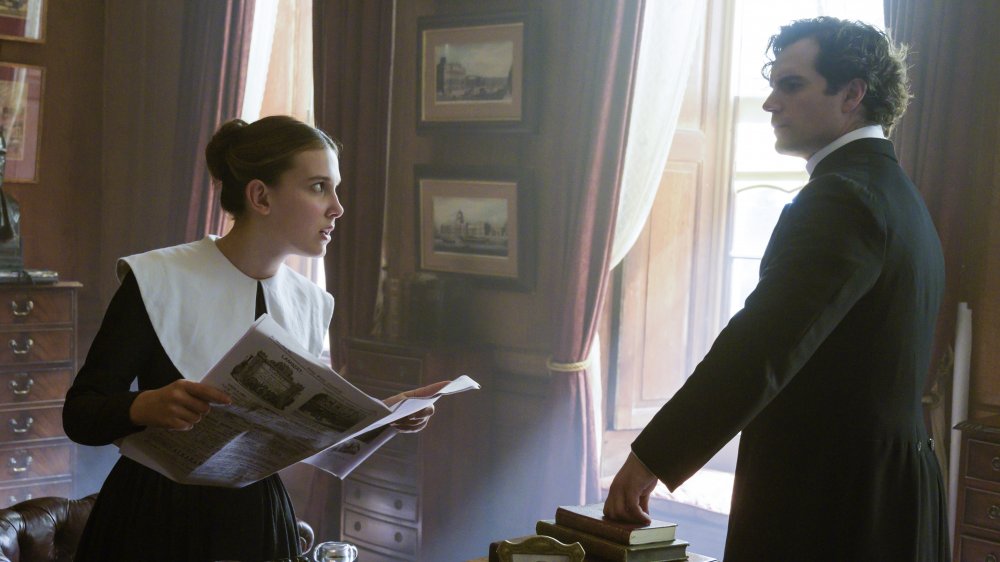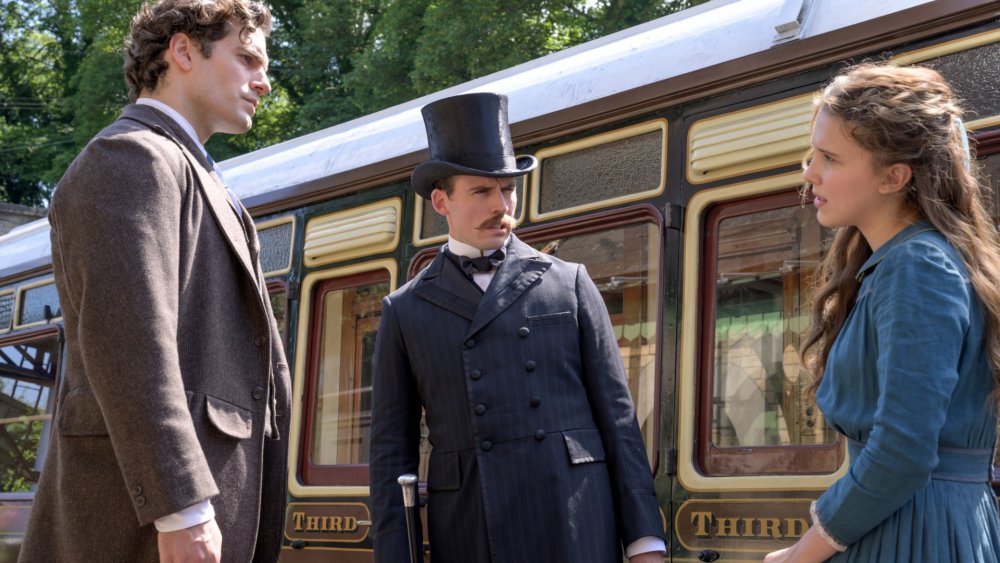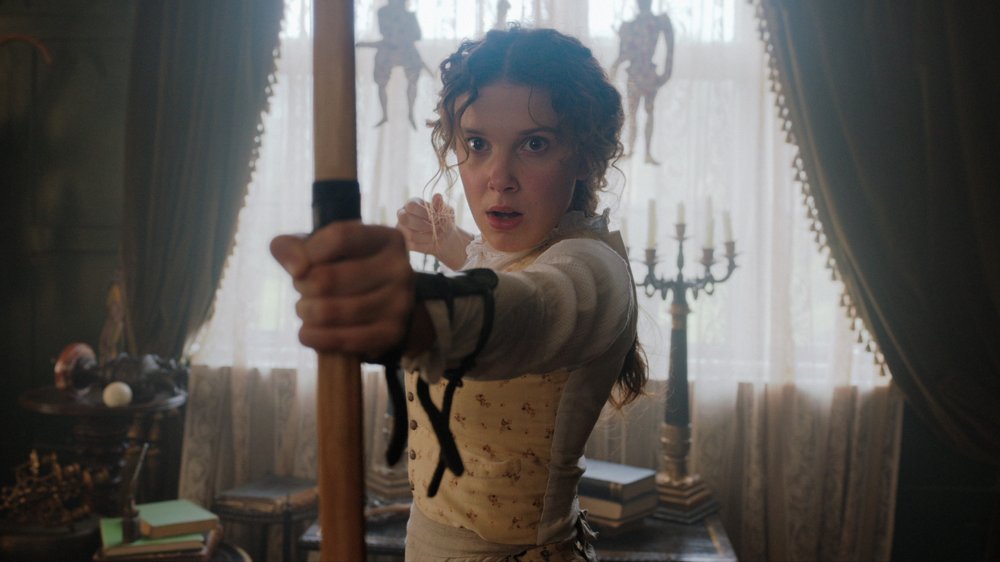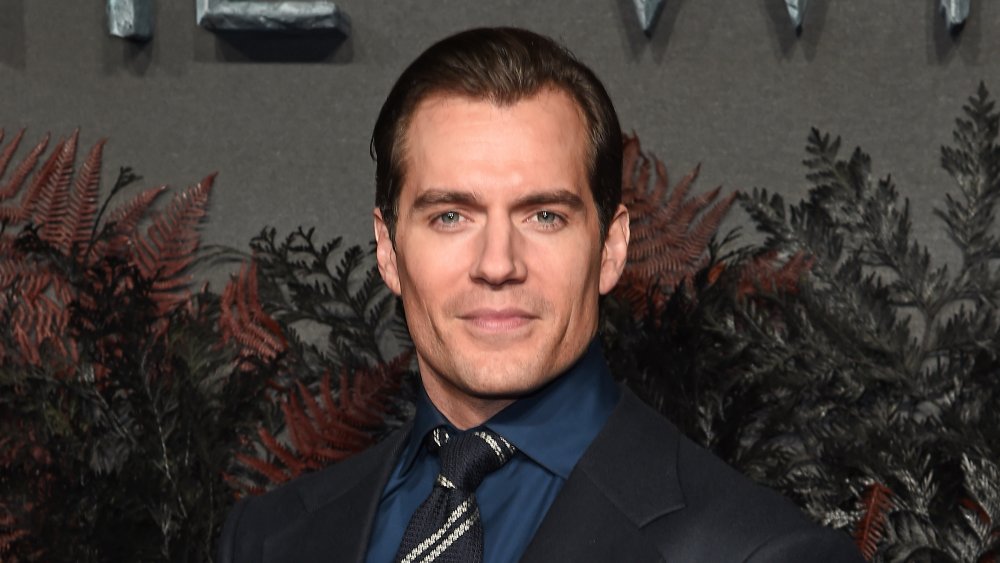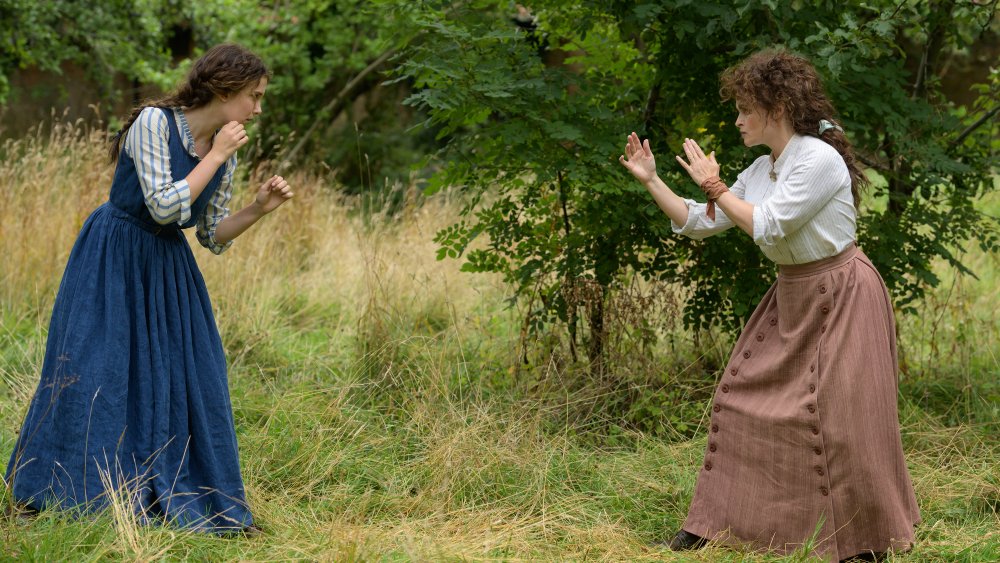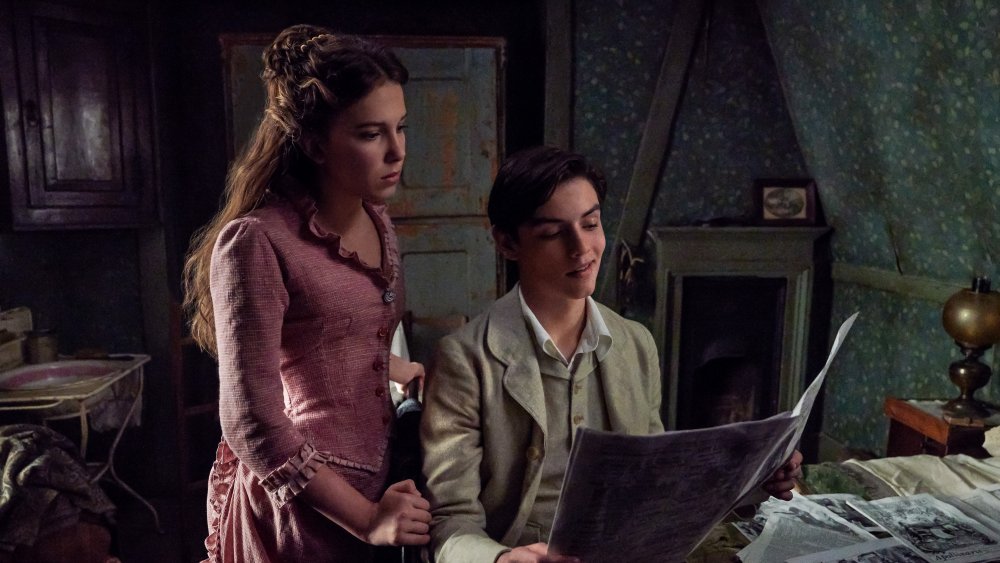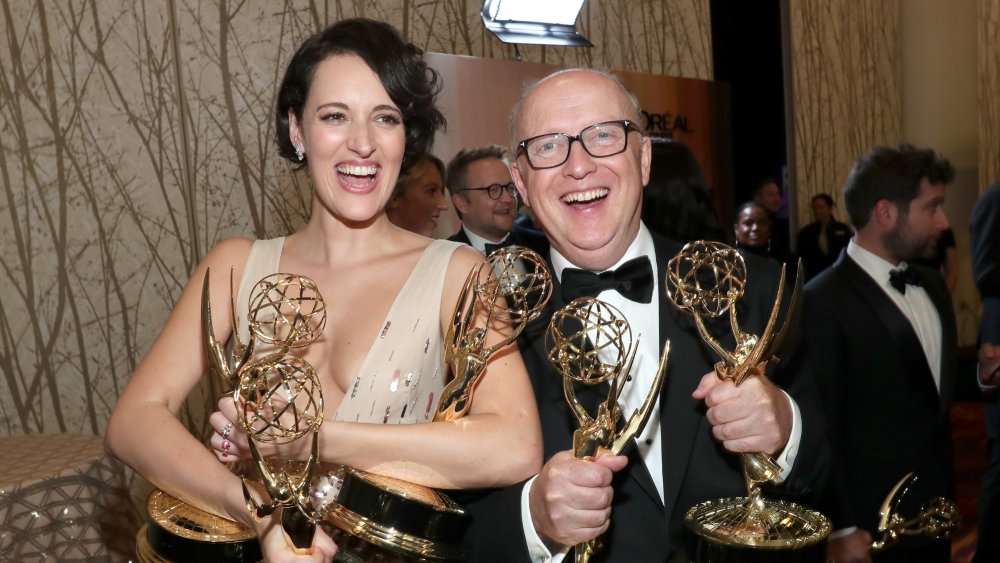Enola Holmes Director Harry Bradbeer On Millie Bobby Brown, Henry Cavill, And More - Exclusive Interview
While he's been hard at it working on British film and television productions since the mid-1990s, director Harry Bradbeer is finally winning acclaim from American audiences thanks to his creative influence in two major imports from across the pond: Phoebe Waller-Bridge's Emmy-winning comedy Fleabag and the acclaimed drama Killing Eve.
But while both of those television series involve some pretty heavy-duty adult themes, it hasn't limited Bradbeer to taking on family-friendlier fare with the Netflix original movie Enola Holmes, starring Stranger Things phenom Millie Bobby Brown in the title role.
Based on author Nancy Springer's hit young adult fiction novel The Case of the Missing Marquess (the first in The Enola Holmes Mysteries book series), the film naturally involves the Sir Arthur Conan Doyle creations Sherlock Holmes (Henry Cavill) and Mycroft Holmes — albeit in key supporting roles. Instead, the movie finds 16-year-old Enola at the center of the case as she deciphers the clues behind the mysterious disappearance of her mother Eudoria (Helena Bonham Carter), which by happenstance gets her wrapped up in the case of a grand conspiracy involving the young Lord Tewksbury (Louis Partridge).
In an exclusive interview with Looper, Bradbeer talked about the talent involved in the film playing on Netflix.
Not so elementary
Congratulations on Enola Holmes. It's so fresh and original. Obviously, looking at your resume — including the brilliant Fleabag — clearly, you're attracted to interesting, fresh ways to tell a story. And all of a sudden you get a script like Enola Holmes. It must be heaven to get not only Enola, but Mycroft and Sherlock Holmes in the story, too.
Absolutely. I mean, the moment you open that script, there's a kind of fresh, almost like punk aesthetic about it. It is so modern and yet it is so accurately as set in the particular period. But the tone of it really appealed to me — and [the way] Mycroft and Sherlock [were written]. The other thing that I've always been obsessed with is dysfunctional families. It's there in Fleabag and lots of my other works. A big part of the appeal for this, in justifying why we should dive into Sherlock again, was that we got to see the family, and we got to see how messed up they were. We got to meet a mother, and I suddenly thought, "Yeah, I can see why Mycroft might have a real issue with this woman."
Interestingly, if you look carefully, I'm sure people will see that there's a difficult, different relationship between Mycroft and Sherlock, and Mycroft and their mother, [and] Sherlock [and their mother]. As an older child, [I wanted to see how Mycroft] felt. I loved talking with them, talking to the boys about what they were like as brothers, and what it was like growing up, and we decided that Mycroft loved going to boarding school. Loved it. Order, calm, a place he could call his own. Sherlock hated it. Didn't like the rules, ran away all the time. All those things actually came in the script, in some lines that we put in, which got cut actually. But I think they might come in again if we had another chance. So I love that.
Hitting the bullseye
It's a decidedly different role for Millie Bobby Brown. How instrumental was it to cast Millie in this role? Was it a make or break sort of situation? Because honestly, I can't see anybody else doing this role but Millie.
You're absolutely right. But the reason why you're right, in a way, is because she chose the books. She found the books with her sister. It's not commonly known, but she found the books with her sister, and she took them to Legendary (the film's production company), and they subsequently took it to Warner Bros. for a distribution deal. So Millie spotted it. Her sister found and read the books, and thought, "Well, Millie's 12 now, but in about three years' time, this could be perfect." So I can't take credit. I wish I could. All I do, I can tell you is that when I read the script, having not been much of a fan of Stranger Things, as not having followed it particularly, I watched Stranger Things with some trepidation because I thought, "My goodness, she's still 14. Can she go to these places?"
When I saw her, even though she barely said anything, I realized, from my experience with working with younger actors, that she could go to all the places and more. I thought, "Well, let's take the script [for Enola Holmes] into an even realer, and in some [instances] darker and sadder places," because I knew she would go to all the corners.
Waiting for Superman
Millie truly is a force of nature. And of course, you worked with another force of nature with Henry Cavill. I mean, obviously, Sherlock Holmes is a legendary character with such presence. Clearly Henry established that in Man of Steel right from the get-go. But I'm wondering, was it Man of Steel or any other of the films where he played Superman — or was it The Man From U.N.C.L.E. or Mission Impossible: Fallout — were any of his performances in those movies instrumental in convincing you that this is the guy for Sherlock? Or was it The Witcher, for example, on Netflix?
Actually, I hadn't watched The Witcher at that point. No, I think what convinced me was looking at two things, really. I looked at his performances and I thought, "There is this other side of you waiting to come out," which some of the roles hadn't allowed him to find. I met Henry for a drink. We had a couple of gin and tonics once in Hammersmith. And we talked about his life and his experiences as an actor, and his experience with his own family, because, as I say, [Enola Holmes is] about families. We found many interesting areas — not so much to mine and him personally — but there were areas in his own nature.
I wanted somebody who could start off very distant and cool, and then gradually melt under the pressure of his sister. You had to meet the Sherlock you knew, and then a sister — that you hadn't met — who comes and changes him, really, emotionally. And I thought, "Well, [Cavill] can do this." And like a lot of these casting things, they aren't necessarily the first person you think of, but the moment you see them, and you realize that there's inherent contradiction in someone — a deep, real, emotional truth to someone — because he's a very truthful, most truthful person. I thought, "This could work."
The other little thing was watching The Man From U.N.C.L.E. and Mission Impossible. I thought Mission Impossible was rather wonderful. I think there was a wonderful impishness [in his films]. I really liked the humor that, particularly recently, he's found. He's very dry, and I love the humor in Henry, so that was another thing that attracted me.
So you get the guy, you're behind the camera. Is there still a moment where you're saying, you step back, and you say, "I'm directing Superman here. This is pretty cool?"
Can I make a confession? I've never seen Man of Steel. I've never seen a Marvel film.
Oh boy. Well he's DC, but you know ...
Oh, sorry. You see? You see how ignorant I am?
I have to make that distinction for the Marvel fans out there, but still, now I bet you want to see it.
Honestly, I haven't seen them. I wouldn't say I was an expert, but I have... I mean, I love what I've seen, but I haven't seen enough of them.
Sure.
So I would never have expected to make a family adventure. I would never have expected to make this. And I have so loved it. I mean, I am dying to do more of this kind of thing.
Helena takes charge
Talking about another superhero — we don't get to see her as much in Enola Holmes — but I love how you sprinkle Helena Bonham Carter throughout the film, because definitely, her presence looms large. And you're not just showing her as the "mom" to Enola Holmes. I mean, Mrs. Holmes, after all, is responsible for instilling in Enola those skills and with those sensibilities. And Helena is one of the very few people who can come in and take that short amount of screen time, especially at the beginning, and have a huge impact.
You're so right. And in fact, we shot some more material of her — the tennis scenes and things like that — that was actually picked up later, because we realized how strong she was from the previews. We realized how important it was to understand this extraordinary thing that [Eudoria] does. So, she was a complex person. She's not a soft mother. She's sort of a tiger mother in a way. She's really tough and she has high expectations. [Offscreen], Helena as a person is utterly delightful. She and I had become great friends. We're constantly texting each other, particularly at the moment. She has so many ideas. It was her idea that she smokes a pipe.
She said she had the idea of this origin story for Sherlock, that there were some things that she had given to Sherlock. One was the pipe; one was using the magnifying glass when she's painting. That was another little addition, terrific ideas. She says that she's always coming up with things, and some of them are crazy. And there was one idea that was completely crazy, and we didn't do it, but we did most things. And of course, she loved the fighting. She jumped into that. She dove into that.
Exploring new challenges
What's great about the film is it invites viewers to effectively follow Enola as she cracks the clues to the mysteries behind the missing Mrs. Holmes. Because you do that, it makes me think of a mystery that a lot of studios and filmmakers can't seem to figure out — that the audiences are smart, and they want to be engaged. Enola Holmes respects the audience and their intelligence.
I agree. I've been making lots of hours of television around 9 o'clock in the evening, and I don't think any people are as clever. The British public and the American public are very clever around that time. Never underestimate that audience. And I didn't adjust my expectations of my audience one iota when I made a family film. In fact, I suspected that I need to be smarter. Thank you for saying that. It's really nice of you to say that. And we did work a lot on the ciphers, making them fun and workable, and plausible, but tricky enough. And I think that, God, if I'd had the time to do it again, I'd have made it even harder.
After the experience of working with Millie could you maybe see yourself starting to lobby to direct a future episode of Stranger Things?
If I did it, it would be because I think that I had something really important to contribute to the whole style of it. And I think that style is pretty well cooking. I think it would be great fun, but why would they want me? I mean, they've got their stuff sorted. They're doing very well.
Since you've had the freedom to put a spin on a classic property like Sherlock Holmes — and his sister, of course, in this case, is there any other time-honored character that you would maybe like to explore, be it a film or a television series?
God, that's a really good question. It's a really good question. And I wouldn't mind having a go at Henry the Eighth. Those Tudors were really complicated people and they had so much thrown at them all the time. What we forget about those Tudor kings and queens was how dangerous their lives were, and how they were — I mean, talk about paranoid — constantly up against it. I think the Tudors are enduring and of course, they'd been done before, but I might have a go at them. Those are at the top of my head.
Fleabag's return and breaking the fourth wall with Enola Holmes
Speaking of television series, we've heard a Phoebe Waller-Bridge say, "OK. Two seasons and we're done with Fleabag." Have you or will you at some point say, "You know, Phoebe, can't we just do one more season of this?" The show was such a blast.
We're really pleased about the way we ended it. It felt like that was a completion. There was somebody who had finally come to terms with themselves. So when you have that kind of catharsis, it's going to take a while before you're going to need another one, because that's the thing. As we go through life, we only need these major catharses in our life, these shakeups, every now and again. Phoebe has said this, so I can say it out loud. She has thought about maybe doing it again when she's 50, or in her menopause. And we liked that. I think there would be challenges enough in our life and more issues and problems [Fleabag has] caused or facing that might be worth tackling again.
Was is it scripted that Millie break the fourth wall and talk to the camera in Enola Holmes? Or did you bring that technique with you from Fleabag? It is so effective, and as we can clearly see, it just makes the story that much more entertaining with the nuance that Millie brings to the film, by breaking that fourth wall throughout.
Well, I'm glad you enjoy it. I think it's important. It wasn't my idea. It was Jack Thorne's idea, who wrote the adaptation. And Jack is, he's a friend of ours, and Phoebe, and we know each other. He had been given the books by Millie to adapt. And he was wondering how this character, who has spent so much time on her own, was going to tell us what she was thinking and feeling. And so he was watching Fleabag one night and thought, "Well, maybe I'll do that." It was his idea.
When I read the script [for Enola Holmes], I thought, "Oh, golly, if I do this movie, Phoebe's going to kill me. She's going to think I've stolen her idea." And then, so I told Phoebe about this the following day, when we were in the mix, and I said, "I'm making this film." And she said, "Oh wow, great." I said, "It's about Sherlock Holmes." She said, "Fantastic." And then I said, "[Enola Holmes] talks to the camera." Phoebe then hesitated for a second, and said, "Oh, you mean like in Shakespeare? Like a soliloquy." And so, I said, "Well, there we are." So, it has been going on forever. In fact, my very first short film, the character talked to the camera, and I only remembered this about two months ago. So it's been in my head for years.
Look at it this way. You're honoring a great, time-honored idea. And again, when you have the right performer it is just golden — and of course that's the case with Fleabag, and certainly the case with Enola Holmes.
Well, thank you. Thank you very much.
